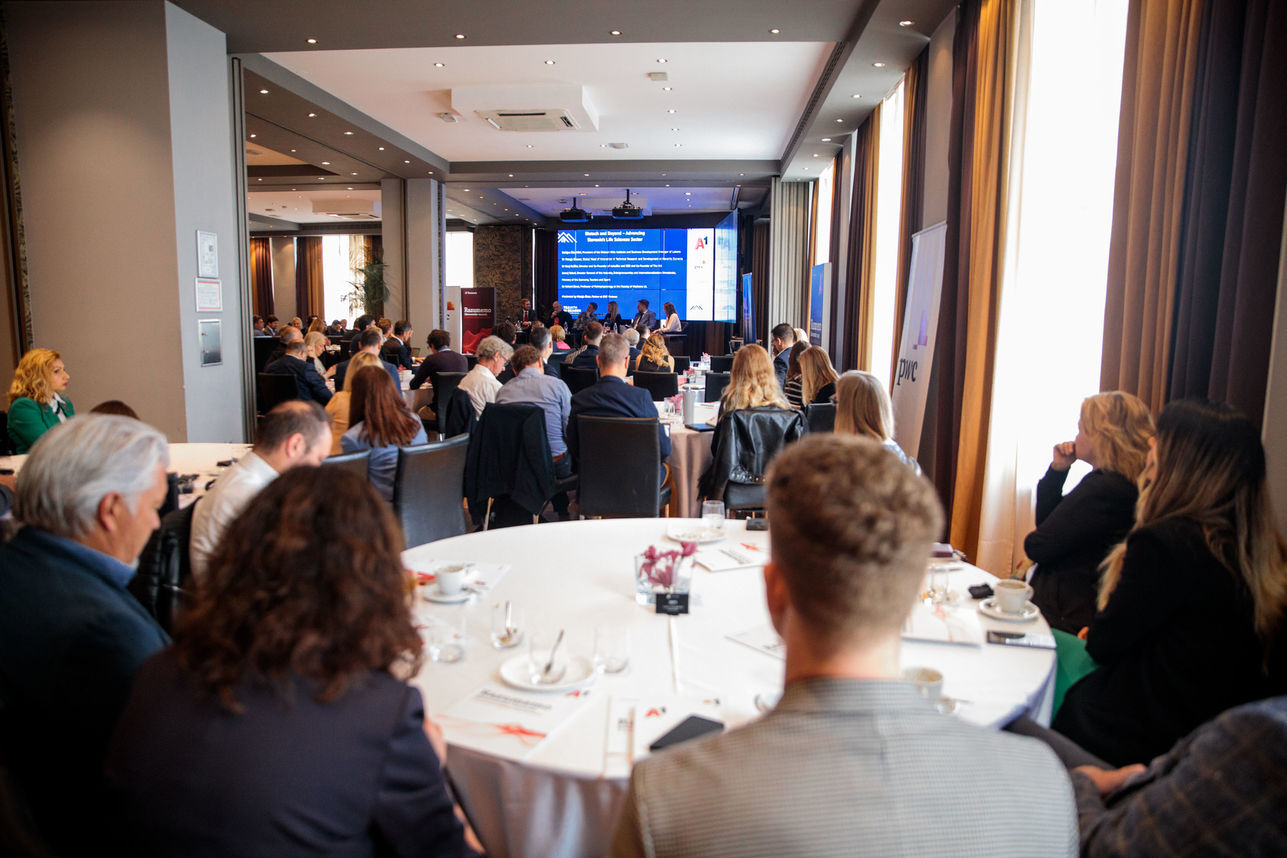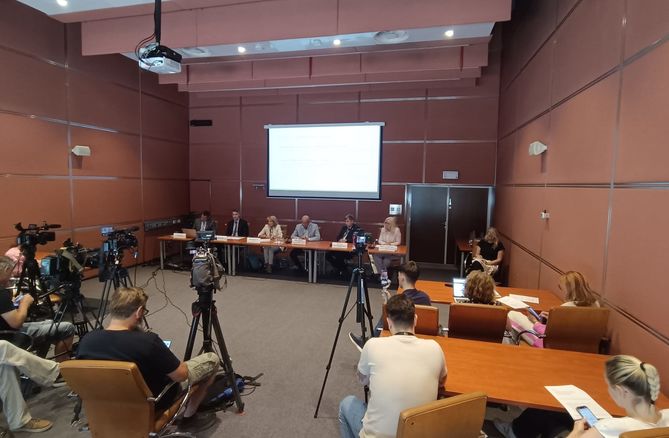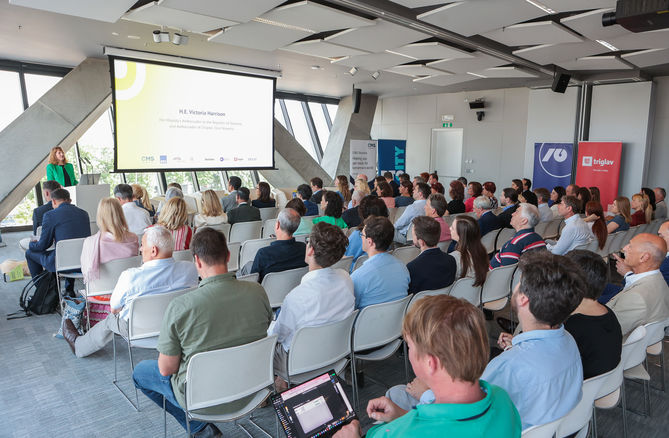Slovenia’s Technological Future Depends on Targeted Investments, Top Talent, and a Strong Supportive Ecosystem

Ljubljana, 22 May 2025 – How can Slovenia leverage its potential and position itself as a leader in biotechnology, cybersecurity, and space? This was the central topic at the latest Tea with Reason conference titled "Shaping Slovenia's Technological Future". Minister Dr Igor Papič emphasized the importance of investing in knowledge and research infrastructure, while representatives from ministries, businesses, and research institutions participated in three thematic panels on how to create a supportive environment for breakthrough companies and technological talent. The focus was on concrete measures – from support schemes and tax incentives to international cooperation and strategic guidelines that could help Slovenia become an attractive destination for development, investment, and highly specialized professionals. The conference demonstrated that we have the know-how, ideas, and opportunities – now we need to connect them into a coherent and ambitious story of a technological future.
The conference was opened by Luka Vesnaver, President of the British- Slovenian Chamber of Commerce and Mart D. Buh, Business Development Manager at the Chamber, who moderated the event.
The opening remarks were followed by the Leaders' Top Talk with Dr Igor Papič, Minister of Higher Education, Science and Innovation, who emphasised that "innovation-led transformation is at the heart of Slovenia’s principal strategic documents, including the Slovenian Development Strategy 2030 and the Scientific Research and Innovation Strategy of Slovenia 2030." He recalled that Slovenia has made significant progress in recent years in developing a more competitive and integrated research and innovation ecosystems. "A key milestone has been the launch of the largest-ever investment cycle in research infrastructure and increased public and private investments in research programs, innovation ecosystems, and national technology platforms. This government recognizes the importance of knowledge and has therefore allocated record funding for science, research, and innovation. Before our government took office, €354 million was invested in these areas. This year, the investment has increased to €674 million, and more than €700 million is planned for next year," he said. The conversation with the Minister was moderated by Tomaž Bratož, Marketing Manager at PwC Slovenia.
The first thematic panel discussion followed, focusing on the development of the biotech-pharma ecosystem and the role of initiatives such as Biotech Hills. "Biotechnology contributes significantly to Slovenia’s economy, accounting for at least 6% of GDP and more than 30% of exports. Our goal at Biotech Hills is to bring together the main stakeholders and, with government support, create a framework that allows Slovenia to gain global recognition on the map," noted Boštjan Čeh, President of the Biotech Hills Institute and Business Development Manager at Labena. "Slovenia is already home to groundbreaking innovation, but we need to strengthen the translation of that innovation into tangible business opportunities and at the same time ensure that these start-ups and scale-ups remain in Slovenia. We must start introducing more attractive incentives and policies that will also help draw skilled talent to the country. Over the next three years, the sector will require several hundred highly skilled professionals, talent we are currently unable to source locally alone," he added.
Jernej Salecl, Director General at the Ministry of the Economy, Tourism and Sport, confirmed that the Ministry recognised biotechnology and pharmaceuticals as strategically important sectors with great potential: "Our joint efforts with Biotech Hills aim to make Slovenia an attractive European destination for research and development (R&D), manufacturing, and investment in this field. Through initiatives such as STEP Slovenia, SRIP Health – Medicine, tax incentives for R&D, and investment promotion measures under the Investment Promotion Act, we are already supporting these efforts." The Ministry is confident that "this will help realize Slovenia’s ambition to become a hub for these industries, and a leading destination for investment, production, and R&D."
The panel also featured Dr Mateja Kramer, Global Head of Innovation in Technical Research and Development at Novartis Slovenia, Dr Enej Kuščer, Director and Co-Founder of AciesBio and CEO and Co-Founder of The NU, and Dr Robert Zorec, Professor of Pathophysiology at the Faculty of Medicine UL. It was moderated by Mateja Čotar, Partner at CHR Partners.
In the second panel on cyber security and the fight against misinformation in the digital age, Dr Uroš Svete, Director of the Government Information Security Office, pointed out that cyber security is no longer merely an issue of information technology, but a strategic necessity: "The NIS2 Directive and the new Information Security Act (ZInfV-1) emphasize the importance of resilience. Nevertheless, only a handful of small and medium-sized enterprises have a formal strategy, and most invest less than 1% of their revenue in cybersecurity. Cybersecurity requires investment, education, and cross-sector cooperation. Resilience is a shared responsibility of the state and the economy."
Another panelist was Vanja Lombar, Senior Residential and Enterprise Customer Director at A1 Slovenia, which, as part of an international network of more than 200 security engineers, provides comprehensive security solutions for businesses and in this way directly contributes to the digital resilience of the Slovenian economy. She stressed that cybersecurity is no longer just a question of technology: "In a time when cyberattacks are becoming faster, smarter, and above all more targeted, it is unfortunately no longer a question of if, but when we will be exposed to a security incident. While we used to speak about cybersecurity, today – with the looming wave of advanced cyberattacks – we are talking about cyber resilience. It is not about a product or a technical solution, but about a comprehensive approach – cyber resilience is a blend of organizational security culture, technology, planning, training, and leadership."
As a large end-user organisation, Tine Pust, Member of the Management Board at Zavarovalnica Vita, stressed that we should not forget about the human factor when it comes to cybersecurity. He stressed that ongoing investment in employee education is essential to ensure that they are prepared to recognize and deal with emerging digital threats. We were also joined by a special guest from the UK, Dr Jacob Phillipps, Central Europe Cyber Lead at the Foreign, Commonwealth & Development Office, who reaffirmed the UK’s position as one of the most digitally advanced countries in the world. He shared a best practice example – the UK's Active Cyber Defence scheme – which protects the public sector and critical national infrastructure from cyber threats through public-private cooperation.
Drawing attention to the importance of media integrity and protection against misinformation, Stella Litou, CEO of Pro Plus Slovenia and RTL Croatia, said: "In an increasingly complex digital landscape, our responsibility is to deliver verified information and to protect the integrity of our systems. Years of investment in investigative journalism – reflected in the work of our award-winning Dejstva team – go hand in hand with rigorous editorial processes grounded in collective decision-making. Cybersecurity, like journalism, relies on people first: awareness, education, and collaboration are essential to maintaining credibility and resilience." The second panel was moderated by Jure Tepina, Editor in Chief of 24ur.com.
The final thematic discussion focused on the development of the space sector in Slovenia and the new economic opportunities it brings for domestic companies. The importance of Slovenia's recent full membership in the European Space Agency (ESA) and the opportunities this opens up were outlined by MSc Suzana Papež Skubic, Secretary at the Slovenian Space Office and Delegate of the Republic of Slovenia to the International Relations Committee of the European Space Agency: "Slovenia's accession to the European Space Agency represents significant recognition of the quality of the Slovenian space sector, and above all, an opportunity to participate in numerous projects within ESA and beyond." In this respect, she considers the key role to be "building connections both domestically and internationally, and, looking to the future, inspiring young people to develop skills in fields relevant to the space industry."
On the role of the supportive environment continued Dr Zoran Vaupot, Head of Internationalisation Promotion Department at SPIRIT Slovenia. He stressed that SPIRIT sees great development potential in the Slovenian space sector and actively helps companies to enter international markets: "SPIRIT Slovenia promotes the growth of Slovenian companies in the space sector and opens the door to global opportunities through a variety of activities - from organising business delegations and presentations at leading international events to preparing targeted presentation materials. Through strategic partnerships with key international players such as Airbus, THALES, SES, and CNES, and in close cooperation with the Space Office of the Ministry of Economy, Tourism and Sport, SPIRIT Slovenia strengthens the innovation, visibility, and competitiveness of Slovenian companies in the fast-growing space economy."
The last panel discussion also featured representatives of three Slovenian companies active in the space industry: Vid Selič, Head of the Application Center of Dewesoft, Dr Dragi Kocev, CEO and Co-Founder of Bias Variance Labs, and Maja Brelih Lotrič, CEO of LOTRIČ Meroslovje The discussion was moderated by Dr Jernej Pintar, CEO of Technology Park Ljubljana.
The conference concluded with an Expert Wrap Up moderated by Žiga Fišer from the BSCC. He was joined by Adel Abusara, Director, Cybersecurity & Privacy at PwC Serbia and Dr Sašo Džeroski, Scientific Councillor at the Jozef Stefan Institut, who summarised the key findings of the day and offered a perspective on the cross-sector challenges and opportunities presented by the fields of biotechnology, cybersecurity and space.
"We need to shift from talking about cyber resilience to prioritizing cyber security," stressed Abusara. In a world where threats evolve faster than the solutions designed to counter them, he argued, the focus must shift to proactive defense, building fortifications before attacks occur, not simply patching systems afterward. Echoing the need for strategic foresight, Dr Džeroski urged a sharper national focus: "Slovenia must invest in industries and technologies where we can create unique value." He cautioned against spreading resources too thin and advocated for doubling down on niche sectors where Slovenia can truly lead, be it artificial intelligence, green technology, or advanced manufacturing. "Quality over quantity, always," he concluded.
We would like to thank the following partners who made the conference possible: Main Partner – A1 Slovenia, Partner – PwC Slovenia, and Panel Partners – SPIRIT Slovenia and the Ministry of Economy, Tourism and Sport.
Photo highlights are available here.


